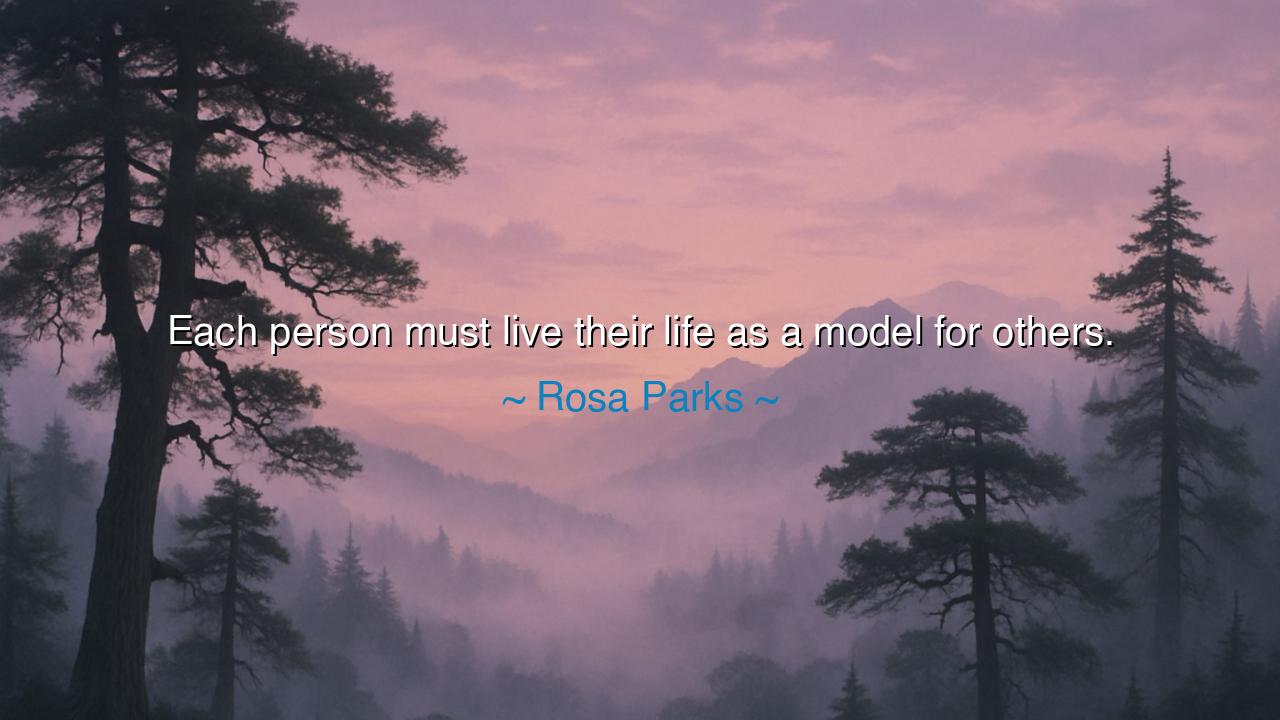
Each person must live their life as a model for others.






The words of Rosa Parks — "Each person must live their life as a model for others." — burn with a quiet but enduring flame. They remind us that life is not lived in isolation; each step we take, each choice we make, echoes into the lives of others. Whether we know it or not, we are always teaching by example. Parks, who sparked a revolution not with violence but with steadfast courage on a bus in Montgomery, understood that the truest form of leadership is not in commanding others, but in living as a model of dignity, conviction, and strength.
The origin of these words lies in Parks’s own experience of struggle and defiance. She was not a woman seeking fame, nor did she set out to become a symbol. On the day she refused to surrender her seat to a white passenger, she was weary not only in body but in spirit — weary of injustice, weary of humiliation. Yet in choosing to stand firm, she showed millions what it meant to live as a model for others. Her simple act became a spark that ignited the Civil Rights Movement. Thus, she lived the truth of her own words: each person’s life, if lived with integrity, can inspire generations.
History is filled with examples of this principle. Think of Mahatma Gandhi, who led by example, choosing nonviolence and simplicity even when surrounded by violence and greed. His life became a model for India and for oppressed people across the world. Or reflect on Nelson Mandela, who, after decades of imprisonment, chose forgiveness over vengeance. By his example, he taught his nation that reconciliation was stronger than hatred. Both men lived lives that became models, just as Parks insisted all of us must do, no matter how small our sphere of influence.
Yet Parks’s words are not only about great leaders; they are about ordinary people too. A parent who shows kindness teaches their child that kindness is strength. A teacher who pursues truth shows their students the nobility of knowledge. Even in the smallest actions — in honesty at work, in compassion to a stranger, in patience with difficulty — one becomes a model for others. The call is universal: to live in such a way that your life shines as an example, whether you are seen by millions or only by a few.
The teaching is also heroic in its challenge. For to live as a model means to live with responsibility. It means understanding that others are watching, that your actions are seeds planted in their lives. It means resisting the temptation to live selfishly, to cut corners, to excuse cruelty. Parks did not speak these words lightly; she knew the cost of living by them. To be a model often means to stand alone, to endure criticism, to bear burdens heavier than one’s own. Yet in doing so, you offer others a path through the darkness.
The lesson is clear: you cannot escape being an example, but you can choose what kind of example you will be. Will your life model courage or fear, compassion or indifference, integrity or compromise? The choice is yours, and it is a sacred one. Parks’s life shows us that even the smallest act of defiance, lived with conviction, can ripple outward to change the world.
What, then, should you do in practice? Live deliberately. Let every word and deed be guided by the awareness that others may follow in your footsteps. Model the virtues you wish to see: fairness, humility, strength, and love. When confronted with injustice, do not only complain — live in such a way that your life itself becomes a protest against it. When surrounded by despair, be the one who lives hope, so that others may learn it from you.
Thus let this wisdom endure: each person must live their life as a model for others. For in truth, your life is a lantern, and others are walking behind you. If you walk with honor, they too will see the path. If you stumble with integrity, they will learn how to rise. And if you live with courage, you will kindle in them the strength to change the world.






AAdministratorAdministrator
Welcome, honored guests. Please leave a comment, we will respond soon